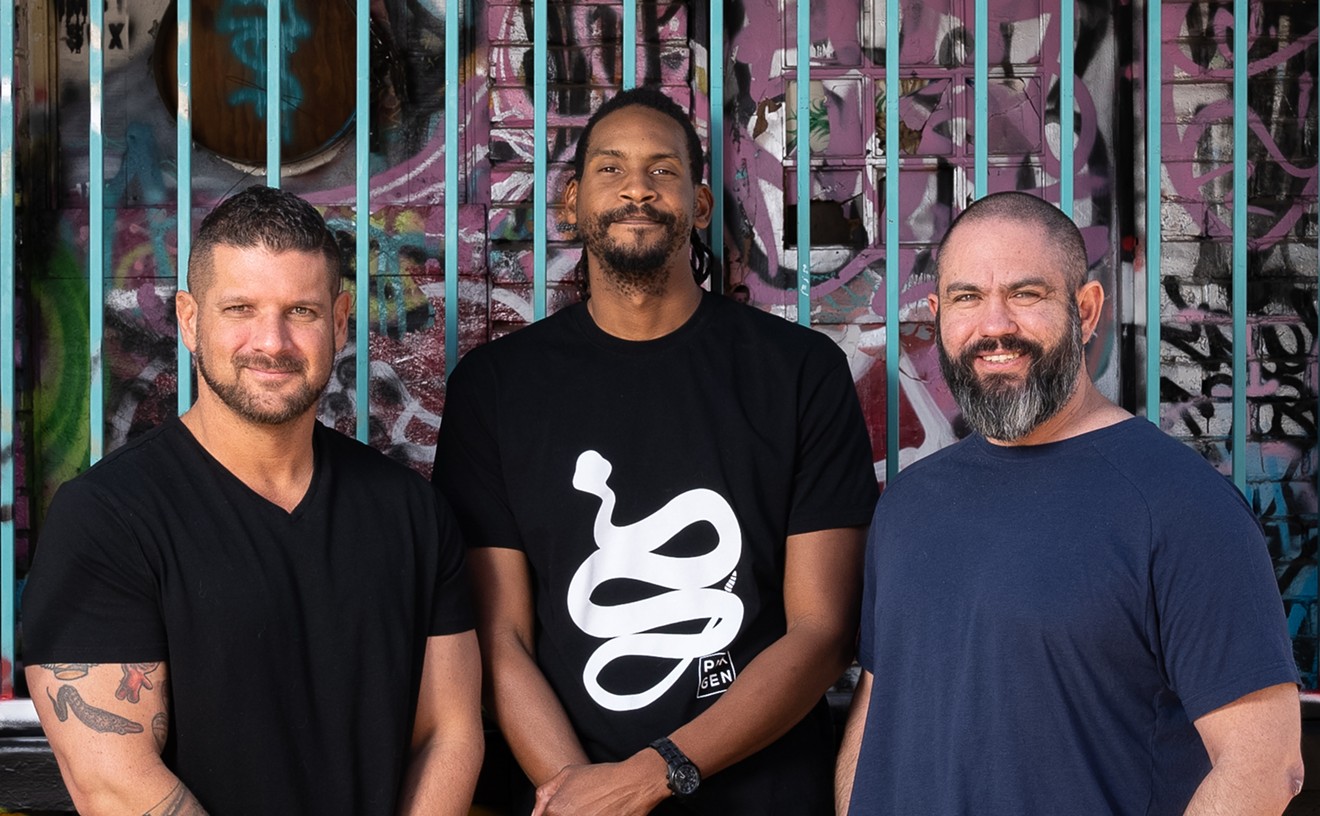Oh, so what, you say. Every horror movie rips off Dracula; the movie is a prototype--de rigueur mortis. But that's the point. And John Carpenter's Vampires loudly keeps proclaiming that it's a transfusion of new blood into the vampire genre. Its hero, Jack Crow (James Woods), sets us straight about the facts of the vampire m.o.: "They don't go around seducing everyone with cheesy Eurotrash accents."
Yet in this movie, that's exactly what they do. The chief vampiric nemesis of Jack, Montoya (Daniel Baldwin), and the vamp-exterminating team they lead is Valek (Thomas Ian Griffith), a pale Eastern European in an elegant black coat that looks strikingly like a cape. The first time we see this bloodsucker, he speaks sweet nothings to a woman in his cheesy Eurotrash accent, then sends her into orgasmic bliss by draining blood from an artery in her thigh.
Probably the most subversive way the vampire myth could be treated right now would be to play it absolutely straight: evening dress, Balkan accent, bat transformations, the whole bit. That version, not even a century old, comes less from folklore than from theater and film, and there has been no shortage of fresh takes on the cinematic vampire tradition. In the past three decades, we've seen, among countless other variations, the myth as twisted sexual psychodrama in George Romero's Martin (1978); as Harlequin Romance in the Frank Langella version of Dracula (1979), Francis Ford Coppola's Bram Stoker's Dracula (1992), and Interview With the Vampire (1994); as romantic comedy in Love at First Bite (1979); as soft-core erotica in The Hunger (1983); as gritty domestic drama in Near Dark (1987); as troubled-teen saga in The Lost Boys (1987); and as over-the-top action movie in From Dusk Till Dawn (1996) and Blade (1998). Not long ago, I finally saw Peter Wechsberg's Deafula (1975), a bizarre reworking of the legend performed entirely in American Sign Language.
So there would be no shame, and maybe even some freshness, in lovingly executing the old melodramatic tricks. Carpenter's approach--to insist that we're going to get the real, no-nonsense dope on vampires and to then give us every single cliche of the genre--is rather more disingenuous, especially because John Carpenter's Vampires fails to offer us one authentic scare.
The plot, drawn from the 1992 John Steakley novel Vampire$, finds Jack, Montoya, and their scruffy crew searching for vampire nests around the American Southwest and destroying their denizens with commando-style tactics; their efforts are financed by the Catholic Church. When circumstances separate them from the rest of the team, Jack, Montoya, a vamp-infected hooker named Katrina (Sheryl Lee), and Father Adam (Tim Guinee as a young priest who is a neophyte at "slaying") must hunt for the aforementioned nasty fellow in the long coat on their own. Valek is scouring Spanish missions (in this film, vampires aren't repelled by crosses or sanctified ground) for a holy relic that, combined with some mumbo-jumbo, will make him the toughest vampire on the block.
It's remarkable how little terror Carpenter is able to wring out of this setup. Can the guy who turned a stunt man in dark blue overalls and a chalky white mask into the bogeyman of American suburbia really be staging these conventional jolts? Of course, Carpenter's career has hardly been an uninterrupted string of gems since his 1978 breakthrough, Halloween. His last picture that might be called remotely original was They Live (1988), which, until its shoot-'em-up finale, was a marvelously imaginative satire. Did the man who made it really think that these snarling actors, with their fright makeup and silly gymnastic leaping, would terrify us?
He may have thought some gore would help. This film is much grislier than most past Carpenter projects, with severed heads and splattered brains and torsos split down the middle. The effect, though, somehow seems more hilarious than horrific. If John Carpenter's Vampires fails almost completely as a horror movie, it is still reasonably entertaining as a testosterone-soaked action comedy. To borrow a phrase from Ted Turner, it's a Movie for Guys Who Like Movies, guys who might fantasize themselves part of the buddy-buddy slayer team, guys celebrating with beer and whores after a good day's slaughter.
The only significant woman's role in the film is Lee's Katrina. Lee first made an impression as the corpse of Laura Palmer in TV's Twin Peaks, and she's naked and prostrate for most of this movie, too. Katrina and Montoya make a halfhearted attempt at a love connection, but the movie's only sense of an intimate relationship is between Montoya and Jack. We're told in no uncertain terms how to interpret this, however, because there's an anxious undercurrent of homophobia to the film, most evident when Jack roughs up Father Adam.
Scary or not, there's energy in the way Carpenter frames and cuts his movies, and there's energy to spare in Woods' performance. The spectacle of Woods coming out of his skin is always a pleasure, even in a lousy film, and he's been in a few of those. With his hyperintelligent, jittery asides and eye-rolling self-deprecation, he does jaunty swagger more endearingly than almost any other contemporary actor. Woods is so familiar in character roles that his unique likability as a hero is sometimes overlooked; he may be the most underrated leading man in American movies.
He certainly does more to save John Carpenter's Vampires than the director, who felt compelled to add his name to the title. Maybe that pretentious flourish will give rise to a whole new horror-film subgenre: the signature vampire movie. Maybe we can expect Woody Allen's Vampires, Spike Lee's Vampires, Oliver Stone's Vampires, and, on PBS, the six-part Ken Burns' Vampires.
John Carpenter's Vampires
Directed by John Carpenter; with James Woods, Daniel Baldwin, Thomas Ian Griffith and Sheryl Lee.
Rated










